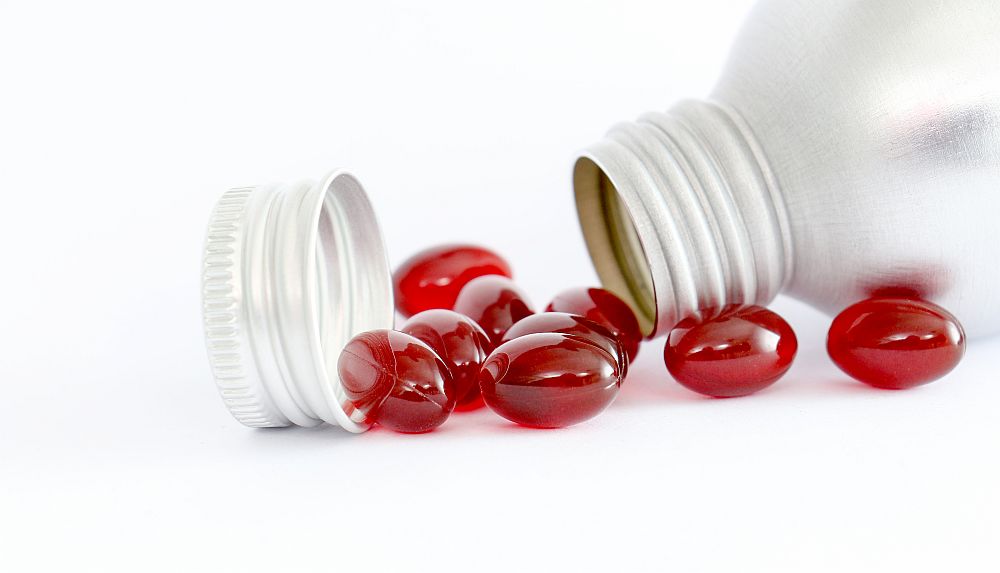Fish Oil Vs. Krill Oil - From Fins To Shrimp Tails
Understanding the differences and similarities between fish oil vs. krill oil is crucial for making informed decisions about dietary choices.
Author:Katharine TateReviewer:Karan EmeryFeb 26, 20247.7K Shares124.9K Views

In the vast sea of nutritional supplements, two marine-derived oils have gained considerable attention for their potential health benefits: fish oil and krill oil. As individuals seek ways to enhance their well-being, the debate surrounding these two oils has become more pronounced.
Understanding the differences and similarities between fish oil vs. krill oilis crucial for making informed decisions about dietary choices. In this article, we will explore the unique characteristics of each oil, their respective advantages, and potential considerations to help you navigate the seas of nutritional supplementation.
Fish Oil
Fish oil is derived from the tissues of oily fish, such as salmon, mackerel, tuna, herring, and sardines. It is rich in omega-3 fatty acids, particularly eicosapentaenoic acid (EPA) and docosahexaenoic acid (DHA), which are essential for human health. These fatty acids play crucial roles in various bodily functions, including cardiovascular health, brain function, and inflammation regulation.
Fish oil supplements are commonly consumed to boost omega-3 intake, especially for individuals who do not regularly consume fatty fish in their diet. They are available in various forms, including softgels, liquid extracts, and capsules, making them convenient for daily supplementation.
In addition to EPA and DHA, fish oil contains other nutrients such as vitamin D and protein, which contribute to its overall health benefits. Research studies have shown that regular consumption of fish oil may help reduce the risk of heart disease, lower blood pressure, improve cognitive function, and alleviate symptoms of inflammatory conditions such as arthritis.
Fatty Acid Profiles Of Fish Oil
Fish oil is renowned for its rich content of omega-3 fatty acids, particularly eicosapentaenoic acid (EPA) and docosahexaenoic acid (DHA). These essential polyunsaturated fatty acids play crucial roles in various physiological processes and are associated with numerous health benefits. The fatty acid composition of fish oil can vary depending on the species of fish from which it is derived, but some common components include:
- Eicosapentaenoic Acid (EPA) - EPA is an omega-3 fatty acid known for its anti-inflammatory properties. It plays a key role in supporting cardiovascular health by reducing blood clot formation and promoting blood vessel dilation.
- Docosahexaenoic Acid (DHA) - DHA is another omega-3 fatty acid that is integral to brain development and function. It is a major structural component of the brain and the retina of the eyes, contributing to cognitive health and visual acuity.
- Alpha-Linolenic Acid (ALA) - While fish oil is not a significant source of ALA, some varieties may contain small amounts. ALA is a plant-based omega-3 fatty acid commonly found in flaxseeds, chia seeds, and walnuts.
- Omega-6 Fatty Acids - Fish oil typically contains a lower proportion of omega-6 fatty acids compared to omega-3s. Maintaining a balanced ratio of omega-3 to omega-6 is considered important for overall health.
- Saturated Fats - Fish oil generally contains low levels of saturated fats, contributing to its reputation as a heart-healthy supplement.
Krill Oil
Krill oil is a nutritional supplement derived from tiny, shrimp-like crustaceans called krill. These small marine organisms are a crucial part of the oceanic food chain, and they thrive in cold, nutrient-rich waters. Krill oil has gained attention in recent years as an alternative source of omega-3 fatty acids, particularly EPA (eicosapentaenoic acid) and DHA (docosahexaenoic acid), similar to those found in fish oil.
One of the distinguishing features of krill oil is the presence of phospholipids, which are a type of fat that enhances the absorption of omega-3s in the body. The phospholipids in krill oil are believed to make the omega-3 fatty acids more bioavailable, meaning they may be absorbed more efficiently compared to other sources.
In addition to omega-3 fatty acids, krill oil contains astaxanthin, a powerful antioxidant responsible for the reddish color of krill and certain crustaceans. Astaxanthin has been studied for its potential anti-inflammatory and antioxidant properties, contributing to the overall health benefits of krill oil.
Fatty Acid Profiles Of Krill Oil
Krill oil, like fish oil, is recognized for its omega-3 fatty acid content, but it possesses a distinct composition due to its unique source—tiny crustaceans known as krill. The fatty acid profile of krill oil includes:
- Eicosapentaenoic Acid (EPA) - EPA is a prominent omega-3 fatty acid found in krill oil, contributing to its anti-inflammatory properties. It plays a role in supporting cardiovascular health and may have benefits for joint health.
- Docosahexaenoic Acid (DHA) - DHA is another crucial omega-3 fatty acid present in krill oil. Known for its significance in brain function and development, DHA supports cognitive health.
- Phospholipids - Unlike fish oil, krill oil contains omega-3 fatty acids in the form of phospholipids.
- Phospholipids enhance the bioavailability of omega-3s, potentially improving their absorption in the body.
- Astaxanthin - Krill oil is uniquely characterized by the presence of astaxanthin, a powerful antioxidant.
- Astaxanthin gives krill oil its reddish color and contributes to its potential anti-inflammatory and antioxidant properties.
- Omega-6 Fatty Acids - Krill oil contains omega-6 fatty acids, but the ratio of omega-3s to omega-6s is generally considered favorable for health.
Choosing Between Fish Oil And Krill Oil
When deciding between fish oil and krill oil, individuals should consider various factors to determine which supplement aligns best with their health goals and preferences. Here are key considerations for making an informed choice:
- Omega-3 Fatty Acid Content - Evaluate the specific levels of EPA and DHA in both fish oil and krill oil supplements. Consider your desired intake of these omega-3 fatty acids, which play crucial roles in cardiovascular health and brain function.
- Bioavailability - Krill oil contains omega-3 fatty acids in the form of phospholipids, potentially enhancing their bioavailability compared to the triglyceride form in fish oil. If absorption efficiency is a priority, krill oil may be a preferred option.
- Additional Nutrients - Consider the presence of additional nutrients. Krill oil is unique in containing astaxanthin, an antioxidant with potential health benefits. Fish oil may contain other beneficial compounds such as vitamin D and protein.
- Sustainability - Assess the sustainability practices of the manufacturers. Sustainable sourcing of both fish and krill is crucial to minimize environmental impact and preserve marine ecosystems. Look for products certified by reputable organizations.
- Potential Side Effects - Be aware of potential side effects associated with each supplement. Some individuals may experience digestive issues or a fishy aftertaste with fish oil, while krill oil is generally considered to have a milder taste.
- Environmental Impact - Consider the broader environmental impact of your choice. Overfishing and unsustainable harvesting practices can harm marine ecosystems. Opt for products that adhere to responsible and eco-friendly fishing methods.
- Personal Preferences - Take into account personal preferences, including ease of use and preferences for capsules or liquid forms. Some individuals may find krill oil more palatable due to its potential lack of a fishy aftertaste.
- Health Conditions and Goals - Consider any specific health conditions or goals you have. For example, if you are primarily focused on cardiovascular health, the high EPA and DHA content in both fish and krill oil may be beneficial.
Fish Oil Vs. Krill Oil - FAQ
Is Krill Oil Actually Better Than Fish Oil?
Krill Oil May Improve Heart Health More Than Fish Oil
Doses varied based on body weight ( 9 ). It found that both fish oil and krill oil improved several heart disease risk factors. However, they also found that krill oil was more effective than fish oil at lowering blood sugar, triglycerides and “bad” LDL cholesterol.
Who Should Not Take Krill Oil?
Bleeding disorders: Krill oil can slow blood clotting. It might increase the risk of bleeding in people with bleeding disorders. Seafood allergy: Some people who are allergic to seafood might also be allergic to krill oil supplements. Avoid using krill oil or use it cautiously if you have a seafood allergy.
Can You Take Krill Oil And Vitamin C Together?
No interactions were found between Fish Oil and Vitamin C. However, this does not necessarily mean no interactions exist. Always consult your healthcare provider.
Wrap Up
In the ongoing dialogue of fish oil vs. krill oil, it's evident that both supplements possess distinct qualities and potential health benefits. While fish oil remains a staple in many individuals' wellness routines due to its high omega-3 content and extensive research backing its efficacy, krill oil offers unique advantages such as better absorption and a potent antioxidant called astaxanthin.
Ultimately, the choice between these oils should be guided by personal health needs, preferences, and considerations. Consulting with a healthcare professional can provide tailored advice, ensuring the optimal incorporation of either fish oil or krill oil into one's regimen for enhanced well-being.

Katharine Tate
Author

Karan Emery
Reviewer
Latest Articles
Popular Articles
